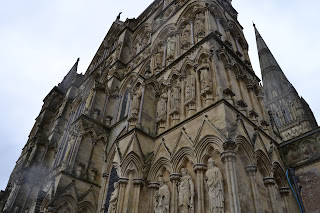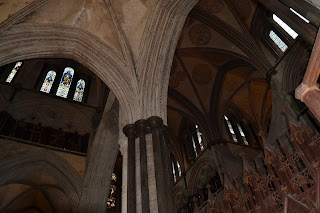It is several weeks since my wife Carole and I returned from the New Forrest vacation in Southern England. I visited the Navel Dockyard Museum and put a number of photos on the blog. They were all of ships.
We also visited Salisbury Cathedral and were breath taken by the Norman Archways and the whole interior of the Cathedral. We walked around in wonder clicking away with my camera. At the end of the roaming tour we saw the Magna Carta. This I could not photograph because it is kept in a dark tent like covering. However, the splendour that preceded the Magna Carta made it a bit of an anti-climax. The visual wonder trounced the important document that helped bring about an ideology of our nation and many others too. All this was lost in a kind way because it was a wonderful day out for more visual reasons than the important document. Even though Carole was suffering from a heavy cold. We both enjoyed Salisbury for so many fine reasons. Most of all, good old English history.
It was a great day out and we also saw the town centre with all its many shops. However, the Cathedral was something spectacular.
 |
| There were many old buildings mingled with new in Salisbury Town centre |
 |
| Modern coffee shops in old buildings |
 |
| Even the local cinema was an old world building |
 |
| The archway by the fudge making shop |
 |
| Old and new standing together |
 |
| It was thirty six years since I was last here. I remembered this old building |
 |
| Everything was quaint and easy on the eye. |
 |
| Then we came upon the Cathedral |
 |
| As we got closer the splendour became more apparent |
 |
| We tried to imagine the tradesmen used in such a lavish construction |
 |
| Everything was awe inspiring |
 |
| I kept thinking of the William Golding Novel - The Spire |
 |
| It must have caused a few headaches when constructed by the Normans |
 |
| Even small doors were elaborate arches |
 |
| The Spire - a novel depicts how difficult it was to build such monuments |
 |
| These cloisters remind me of Jesus Collage - Cambridge |
Also the Titus Groan and Gormanghast Novels
 |
| It was like stepping back in time |
 |
| This was just the beginning of our walk about. |
 |
| Upon entry we saw this |
 |
| Then we began to look up from the inside |
 |
| The Normans certainly loved their arches |
 |
| Everywhere there was elaborate arches holding up the colossal Middle Age structure |
 |
| Everything was designed to impress |
 |
| Then we came across a model diorama of men building the Cathedral |
 |
| This diorama gave a wonderful insight of the Middle Age people going about construction work |
 |
| Many angles of work were covered |
 |
| It was magnificent to observe |
 |
| Its one of the reasons I love being English. My country is stooped in past glory. Its all there, but its the little things. |
 |
| There always seems to be more to discover. |
 |
| If I lived for a thousand years I could never tire of England |
 |
| Yet the Norman overlords who built this probably spoke French |
 |
| The wonder never left us the whole time we were there |
 |
| There were nooks and crannies everywhere but they still had splendour with their arched doorways |
 |
| There was always something else to grab ones attention |
 |
| Sometimes the splendour was overwhelming - one thing after another. |
 |
| Whenever I looked up I was mesmerised by those fabulous Norman arches |
 |
| Figurines of past men of the church |
 |
| All statues were of bygone clerics |
 |
| Some of the stained glass was breathtaking |
 |
| Sir John de Montacute fought at the Battles of Crecy 1346 and Poitiers 1356 He was Steward to King Richard II and died in 1389 |
 |
| Everywhere the was further examples of Norman splendour |
 |
| One could walk about in here for hours |
 |
| Carole finds something of interest too |
 |
| Once Norman Knights and other dignitaries packed this place |
 |
| Everywhere had something unique and interesting. A little piece of history |
 |
| There was so much information going into our heads as we made our way about the Cathedral. |
 |
| Every pillar and post had something |
 |
| Every stained glass window had an event of some kind |
Finally we left the Cathedral and went into the souvenir shop. There was a cafeteria too. In the shop I found hereditary name tags with coats of arms for various surnames. I looked for my name Powell and found the coat of arms upon a fridge magnet and book marker. I bought them of course. I knew my name was of Welsh origin and that it came from Powys. I'm informed there is a Norman Castle called Castle Powell too. I wonder if the local people of the area inherited such a name because of the overlord? Or all people of Powys were once called Powell?
 |
| My families coat of arms. Perhaps some soldier from my family tree fought under this banner during Middle Age Battles - Perhaps Agincourt with Henry V - who knows? |
 |
| Finally after a coffee and natter we moved on towards the Magna Carta. It was along the cloister in another room away from the Cathedral. |
 |
| The new room along the cloister was where the Magna Carta was. The building was round with a minnie splendour |
 |
| I took camera shots of the surrounding room |
 |
| The pillars were more slender |
 |
| The stained glass was more uniform and newer looking |
Of course we could not photograph the Magna Carta but it was the idea or ideology of what it represents as opposed to the visual splendour we had witnessed amid the Norman architecture. A photo would mean nothing against the great architecture.







No comments:
Post a Comment